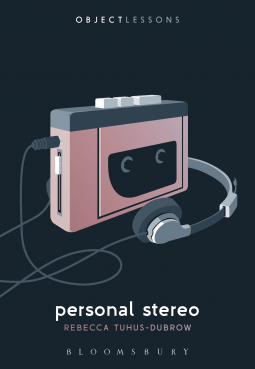
Personal Stereo
Object Lessons
by Rebecca Tuhus-Dubrow
This title was previously available on NetGalley and is now archived.
Send NetGalley books directly to your Kindle or Kindle app
1
To read on a Kindle or Kindle app, please add kindle@netgalley.com as an approved email address to receive files in your Amazon account. Click here for step-by-step instructions.
2
Also find your Kindle email address within your Amazon account, and enter it here.
Pub Date 7 Sep 2017 | Archive Date 11 Sep 2017
Description
Object Lessons is a series of short, beautifully designed books about the hidden lives of ordinary things.
When the Sony Walkman debuted in 1979, people were enthralled by the novel experience it offered: immersion in the music of their choice, anytime, anywhere. But the Walkman was also denounced as self-indulgent and anti-social—the quintessential accessory for the “me” generation. In Personal Stereo, Rebecca Tuhus-Dubrow takes us back to the birth of the device, exploring legal battles over credit for its invention, its ambivalent reception in 1980s America, and its lasting effects on social norms and public space. Ranging from postwar Japan to the present, Tuhus-Dubrow weaves history, cultural criticism, and her own memories into a revealing story that allows us to see our current technology-saturated moment afresh.
Object Lessons is published in partnership with an essay series in The Atlantic.
Advance Praise
“Personal Stereo is loving, wise, and exuberant, a moving meditation on nostalgia and obsolescence. Rebecca Tuhus-Dubrow writes as beautifully about Georg Simmel and Allan Bloom as she does about Jane Fonda and Metallica. Now I understand why I still own the taxicab-yellow Walkman my grandmother gave me in 1988.” – Nathaniel Rich, author of Odds Against Tomorrow
“Rebecca Tuhus-Dubrow's affectionate history traces the Walkman out of an electronics workshop in bombed-out postwar Tokyo to global icon of solitary, un-networked bliss.” – Sasha Issenberg, author of The Sushi Economy
Available Editions
| EDITION | Paperback |
| ISBN | 9781501322815 |
| PRICE | US$14.95 (USD) |
Featured Reviews
 david s, Media/Journalist
david s, Media/Journalist
A history of the walkman and a picture of that era (1980s) when portable music was still a novelty. Now we have iPads and iPods and Smartphones, but back then they were a groundbreaking technology. And how they succeeded by removing features. Well worth the read.
 Hazel S, Educator
Hazel S, Educator
Roy Amara was the president of the Institute for the Future. A scientist and researcher his most famous legacy is Amara’s Law, the idea that the impact of technology tends to be overestimated in the short term and underestimated in the long term. The story of the invention and proliferation of the personal stereo is a perfect example of this theory in practice. It is a story that has been told many times in print, though perhaps never as readably as Rebecca Tuhus-Dubrow’s warm, accessible account. The real success of this presentation is the way Tuhus-Dubrow manages to convey the bewitching novelty of the portability of music, something that is now difficult to imagine as not being a feature of everyday life, but which at the time was a genuinely revelatory experience. Appropriately, the analogy of a drug is used throughout the book, the personal stereo, after all had the power to changes users perception of the world, it was a deeply personal experience and highly addictive. Keeping with Amara’s theory, the immediate reaction from some was one of panic, often regarded as a dangerous fad, there were fears that the Walkman could be responsible for a range of societal catastrophes from generational deafness to the decline of western civilisation from a dangerous proliferation of individualism. Fast forward 35 years and the capacity of portable entertainment has increased exponentially from 120 minutes of audio to whole libraries of music, film and reading material.
Though often told as a simple story, that of Sony co-founder Masaru Ibuka’s desire to listen to music without disturbing his family, in reality the invention of the personal stereo is far more complicated, contradictory and non-linear. Tuhus-Dubrow nimbly navigates the contradictions – Sony themselves endorsed multiple versions of the story of how the Walkman was invented – as well as the multiple players, including interviewing Andreas Pavel who is credited with inventing a personal stereo system that pre-dates Sony’s Walkman. It’s very much a social constructionist approach to technology, one that also acknowledges non-linear progression. The personal stereo involved no new technology and in fact involved removing functionality from existing products, so despite being a new product, the innovative element was in how technology was used, not created.
Personal Stereo, part of the Object Lessons series, is immensely readable, fast moving and well structured. Rebecca Tuhus-Dubrow’s voice is distinctive and one gets a sense of her personality and individual relationship with the personal stereo through the way she tells the story without it ever being obtrusive or indulgent. An object lesson in how to write about technology well.
 Marie S, Reviewer
Marie S, Reviewer
I grew up in the era that the walkman was at its height of popularity and I so remember how it was such a wanted item. So for me this was a very fun book to read about its history. This was a very well written and not dry history of a piece of tech that changed the world in its own way. I highly recommend this book.
Readers who liked this book also liked:
Sara T. Behrman
Children's Fiction, Outdoors & Nature, Parenting & Families


















